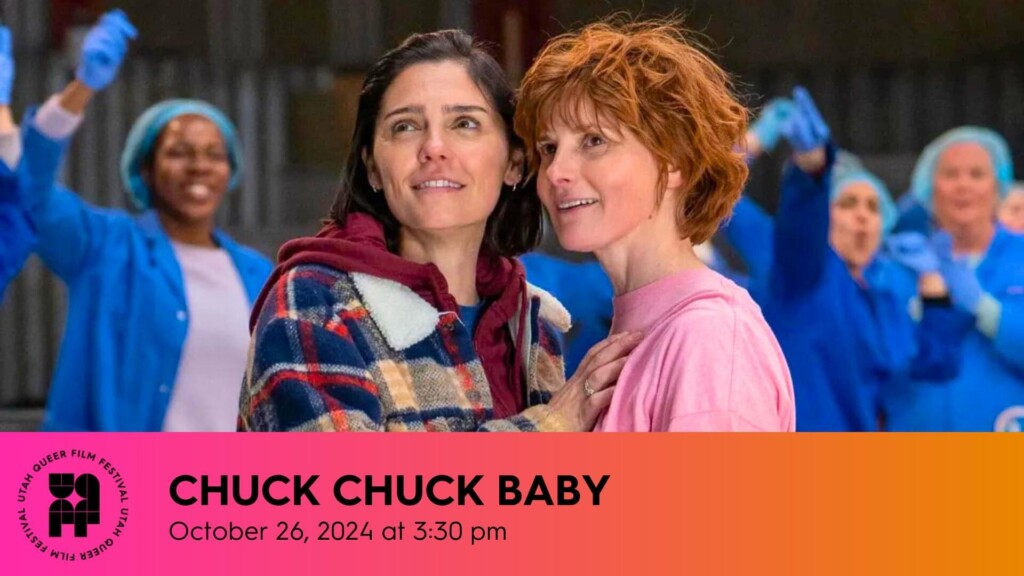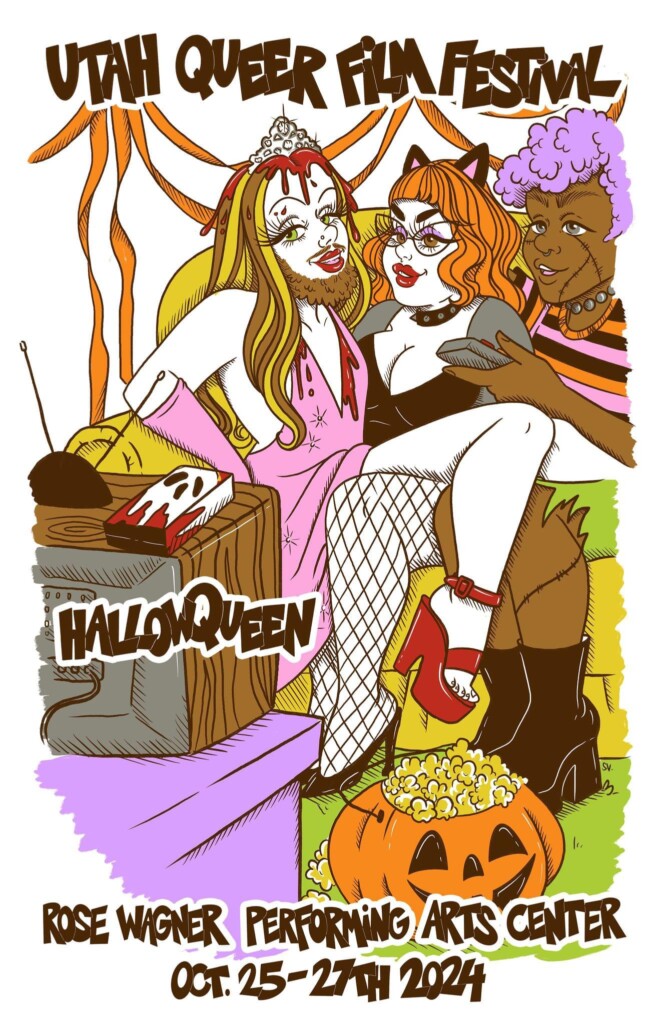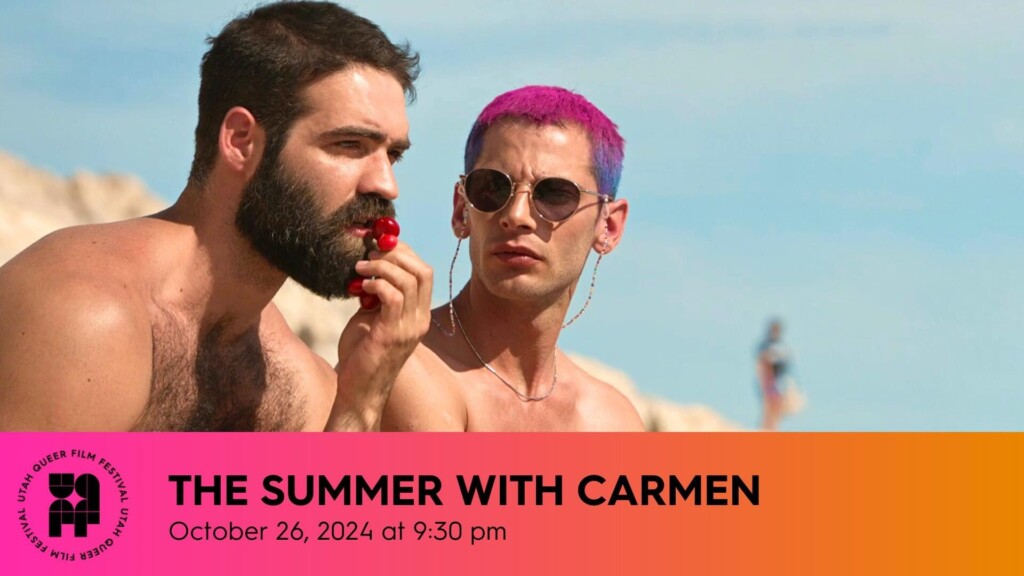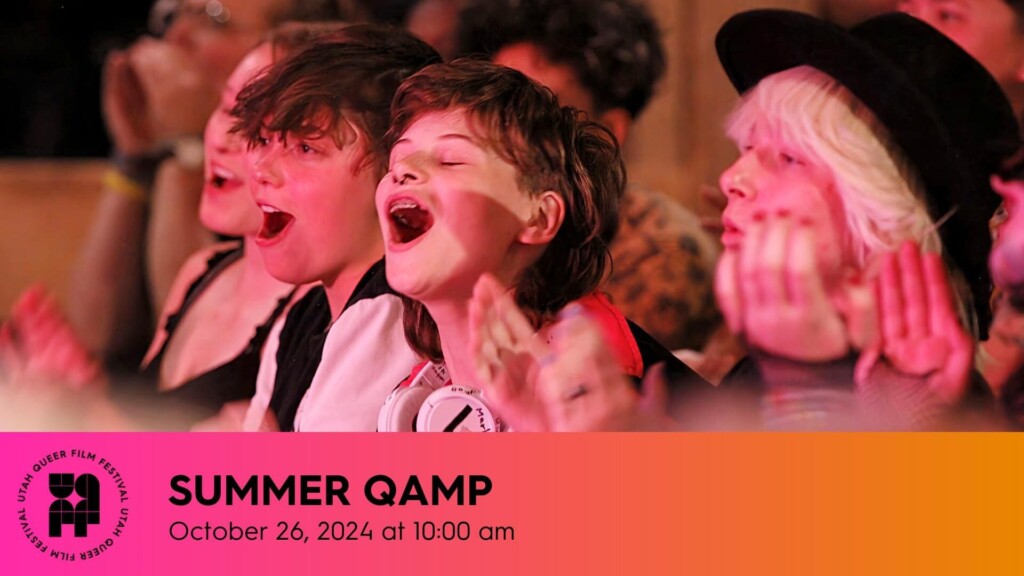EDITOR’S NOTE: This three-article package highlights the Utah Film Center’s Utah Queer Film Festival, which marks its 21st year. The second feature is a feature about the Life After Laramie concert of world premieres and the third feature is a detailed rundown of the 2024 slate of feature and short films.
Entering its third decade, one of Utah Film Center’s longest running festivals will launch next week with a fabulous slate of feature-length and short films, many of which are receiving a Utah premiere, along with a concert featuring world premieres of works by four composers and several workshops. Formerly known as Damn These Heels, the Utah Queer Film Festival (UQFF) will take place Oct. 25-27 at the Rose Wagner Center for Performing Arts. This is the first festival in the 21-year-history to be led by a Black queer man and a queer woman.
With HallowQueen as the theme of the 21st festival, the slate comprises 14 feature films, four films that will be available for virtual screening for one week after the festival, five short films which will open several feature screenings and 15 short films that have been curated into programs highlighting Utah-based filmmakers, queer BIPOC stories and in keeping with the approaching Halloween festivities, a selection of films to satisfy one’s taste for eerie, spooky, nightmarish tales. The slate was programmed by a committee comprising 27 queer community participants, led by Cat Palmer, festival director. Audience members are invited to wear costumes throughout the weekend.
Each year’s festival slate (see this link at The Utah Review for a detailed rundown of the selections) has reflected the evolving creative brief for queer cinema that has led to compelling narratives with intersecting themes, fully rounded complex characters, strong production values for quality and deftly executed flexing of genre and format.
In a joint interview with The Utah Review, Palmer and Russell Roots, festival director and the Utah Film Center director of exhibition as well as the manager of the Black, Bold & Brilliant Program, said that neither of their personal favorites among the hundreds reviewed and screened for curation made the final cut. With the diverse makeup of the programming committee, which spans representation of generational and social, cultural, ethnic and racial demographics in the queer community, the curated slate that has emerged reflects an earnest commitment to the festival’s new name just as compellingly. The programming committee started two months earlier than in previous years, Palmer says. They reviewed 196 submissions. The Utah Review screened in advance many of the feature and short films selected for the festival and it can be asserted without exception that there is a program or event in this year’s festival suited to every possible stripe and identity under the expansive queer community umbrella. Plainly, it is the most successful effort in the festival’s history to emulate a big open tent approach in its programming.

Palmer noted that several selections made it in, thanks to the well-argued cases put forth by some of the younger members of the programming committee. For example, Camila Comes Out Tonight, an Argentinian film, made it in, based on a persuasive case put forth by a young committee member who is active in the Utah chapter of the American Civil Liberties Union (ACLU).
Likewise, the committee also took into consideration programming options for individuals who have not yet come out but are interested in supporting despite their concerns about attending such a high-profile event for the community. Four films will be available on demand for one week (see this link at The Utah Review for a detailed rundown of the selections).
There are, for instance, two standout Sundance documentaries in the list. Among the feature length narrative films are excellent international productions from well-known directors. They include Ray Yeung’s All Shall Be Well, which won the Teddy Prize for best LGTBTQ+-themed film at the Berlin International Film Festival earlier this year. The story, set in Hong Kong, is exquisitely acted and weaves together seamlessly the heartbreaking sense of grief after a sudden death, a shift in family dynamics among surviving relatives and the harsh socioeconomic realities of life in Hong Kong.
As for brilliant and deeply meaningful comedy, The Summer with Carmen, from Greece and directed by Zacharias Mavroeidis, is a paragon to be emulated by queer cinema directors who aspire to this genre. Set in Argentina, Inés Barrionuevo’s Camila Comes Out Tonight pops with beautifully executed production values, as it follows a young woman who refuses to hold back her identity and motivations as a feminist and political activist. Lovers of pop music will be enchanted by the soundtrack for Janis Pugh’s Chuck Chuck Baby, a lesbian love story set in an industrial town in northern Wales.
This year’s representation of documentaries continues a solid trend in recent years where directors effectively incorporate archival and historical materials into formats that pack as much dramatic punch as their fictional narrative counterparts. Marking a commendable directorial debut for gay actor Brian J. Smith, A House Is Not a Disco, is an affectionate, but never too sentimental or nostalgically sweet, homage to America’s most famous homonormative community at Fire Island Pines. Finely placed in the richly layered queer narratives is one alluding to the community’s future as the effects of climate change take hold. This film will be the opening night screening (Oct. 25, 7 p.m.).
Two documentaries stand out for their originality in structure and format of storytelling: Chasing Chasing Amy by Sav Rodgers and Desire Lines by Jules Rosskam. Rodgers, who has been obsessed with Kevin Smith’s Chasing Amy (1997) since he first watched it at the age of 12, produces an engrossing examination of the film more than 25 years later, with Smith as well as actor Joey Lauren Adams who starred in the film. But what elevates this particular homage is Rodgers’ decision to come out publicly as a trans man and his relationship with Riley, a woman whom he has married since completing the project. The film is the festival’s closing night screening (Oct. 27, 5:30 p.m.) and Rodgers, along with his wife Riley and producer Alex Schmider, will be attending.
Rosskam’s Desire Lines explores the topic of transmasculinity in a hybrid format — part historical with good use of archival materials and part fiction with an Iranian-American trans man whose exploration of the archives takes him and us through a portal leading back to the beginning of the AIDS crisis at the onset of the 1980s. The film earned a special jury prize in the NEXT category at Sundance this year, as well as the Thessaloniki Silver Alexander Film Forward Award.
The other Sundance documentary is the 2023 film by Alexandria Brombach about the Indigo Girls, It’s Only Life After All, a comprehensive retrospective on Atlanta-based singer-songwriters Amy Ray and Emily Saliers. Brombach will be attending the festival and the film is the festival’s centerpiece screening (Oct. 26, 6:15 p.m.). Another musician’s documentary comes in The World According to Allee Willis, a documentary Alexis Manya Spraic, about the songwriter best known for writing the theme for the Friends sitcom, along with the Earth Wind & Fire mega-hit September and The Color Purple.
From the Artist Foundry‘s Utah Filmmaker Showcase program, A Long Way from Heaven, directed by David Sant, is a thorough overview of the current status of the queer student and staff community at Brigham Young University, which includes several stories that have gone viral nationally in recent years, including the lighting of the iconic Y overlooking the school and Matthew Easton’s commencement ceremony speech in which he came out publicly. The film is an excellent updated complement to Same-Sex Attracted, a documentary directed by Maddy Purves and Zoie Young, which when it premiered at this same film festival four years ago, offered a comprehensive look at the intricate ways queer students at the school navigate the strict university honor code, which punishes students for same-sex relationships and the efforts to have their student organization officially recognized.
This year’s festival will have the largest number of directors on hand for the screening. In addition to Rodgers and Brombach, there will be David Bobrow, writer and producer of Emerald City and numerous members of the creative team for Willa Justice: Drag Queen Private Eye including Jonathan Andre Culliton (director, writer, and producer); Felix Mack (producer); Graham Kolbeins (producer, cinematographer, and cast member) and Lady Chilane (executive producer and cast member). David Sant (director) and Tyler Pace (producer) will be on hand for their documentary, A Long Way from Heaven.
Also various creative producers for short films will be attending their screenings: Fletcher Gibbons (director) and Zealand Despain (producer), Dear Money: A Trans Perspective; Ash Anderson (co-director and writer), William Cowser and Parker Rawlins (co-director), ad Michel Knowles (producer and composer), First Date; Andy Whipple (director), Grounded; Margaret Plumb (director), Trans Punk; Sally Shaum (director and producer) and Kelton Wells (producer), Utah Drag.
Focusing on how other areas of the arts can be integrated into the film festival offerings, organizers brought Miss Coco Peru (Clinton Leupp) last year for an opening night show, which proved to be a success. This year, as part of the festival’s final day, organizers will present Life After Laramie: A Matthew Shepard Memorial Concert (Oct. 27, 2:30 p.m.). Presented as a response to last year’s 25th anniversary of the October 1998 murder of Shepard in Laramie, Wyoming, the concert’s theme (see this link at The Utah Review for a feature about the composers and the works they have written) is about where queer people find home and how place defines their community. There will be world premieres of short works by four Utah-based composers: Miranda Livengood, Garrett Medlock, Chris Myers and Jared Oaks. Highlights include text and songs written by nationally known Taylor Brorby, whose writings include the books Boys and Oil: Growing up gay in a fractured land, Crude: Poems, and Coming Alive: Action and Civil Disobedience; C.E. Janecek, poet and managing editor of The Colorado Review, and the late Utah poet May Swenson. Performers will include musicians from the Ballet West Orchestra, NOVA Chamber Music Series, Utopia Early Music and the Utah Symphony.
Several screenings will open with performances, variously by musicians including Zaza Van Dyke, Josaleigh Pollett and SLC Rock Camp; spoken word artists Cydney Caradonna and River Wood; and, of course, the always extraordinary Madazon Can-Can. The festival will close with an afterparty (Oct. 27, 8 p.m.) at Milk+ (49 E. 900 S., Salt Lake City), and admission is for those 21 and older.
Workshops will include Personal Queer Filmmaking (led by Amanda Madden, Oct. 27, 12:30 p.m.), which will give participants guidance on how to develop their personal stories into scripts and outlines and filming themselves. No film experience is required and Madden, the manager of the Utah Film Center’s Artist Foundry, will offer prompts for developing a concept along with exercises and time for workshopping feedback with other participants.
Skye Emerson, an award-winning screenwriter, will lead The Queer Lens: A Screenwriting Workshop (Oct. 26, 3 p.m.) on topics including working within queer media and identity, developing story ideas and characters; writing loglines and treatments, shaping character arcs and journeys and structuring and formatting stories. Emerson recently completed production on Little Genes, a short film she wrote and co-directed with Amy Redford. Her independent feature, Under the Influencer, was showcased at the 2024 Cannes Film Festival as part of the Queer Screen Goes to Cannes initiative.
Tickets are now available for purchase, and in line with the festival’s commitment to inclusivity, a “pay what you can” pricing model is offered. For a week after the festival, available through Nov. 3, there will be four feature films available for screening on demand. This allows attendees to choose their payment amount based on their financial circumstances. For more information, see the Utah Queer Film Festival website.







